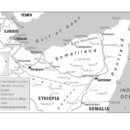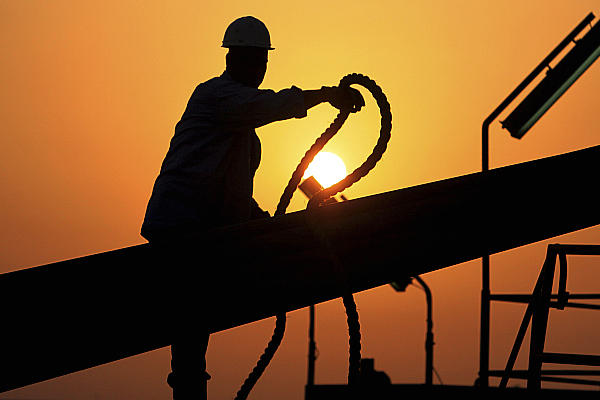Today’s Image of Sudan and Its Long-Term legacy
How is Sudan perceived by the American public? And what does this mean over the long term? These questions arose in two different fora I attended this week, and the answers were worrying. Humanitarians and commercial investors alike fear that the country has acquired a tarnished image that will last for many years beyond the current crisis.
Leaders of American NGOs, and a senior official in the current Administration, agreed that the picture of Sudan purveyed by the humanitarian agencies only captured part of the reality. Hunger and deprivation are real. But the sociability, generosity and spirit of mutual support among the Sudanese people are equally real, and are not reflected in descriptions of Sudan in the public realm.
Businessmen discussing the difficulties of investing in Sudan under the current sanctions regime””including the obstacles to doing business in the south despite its supposed exemption from U.S. sanctions””agreed that the country faces a second and perhaps even more barrier. This is the psychological sanction arising from the fact that a generation of young Americans automatically associates Sudan with horror. Even should the crisis end and sanctions be lifted, this image will persist for a long time, and will be a deterrent to American companies considering investing in the country.
I hope that the energy that has been devoted to exposing the sufferings of the Sudanese people will in due course be matched with the same vigor in presenting the equally true picture of Sudan as a land of great civilizations, of a country with great opportunities for investment, and of a talented and capable people.







sadly the US government and its associated advocacy groups have done a good job of tarnishing sudans image atleast in the west.
Mohaned, you are right. But the question is, what to do about it? The government is spending millions of dollars on public relations firms. All 100% wasted. The best propaganda is the truth which doesn’t need any spin. If this government is serious about having a better image in America it would make it easier for Americans to get visas so they can come and see for themselves. (Forget about this tit-for-tat harassment: just because the U.S. makes it almost impossible for a Sudanese who is not on official business to come to the U.S. doesn’t mean we should be doing the same.) Remember the British teachers who used to teach in our secondary schools? That was the best ever exercise in public diplomacy. They are all lifelong friends and advocates of Sudan. Bring them back! And please please let’s have a system of registering a business that takes longer than building a pyramid. The most effective sanctions on Sudan are the business regulations which are the world’s best deterrent on a modern businessman in a competitive era.
I’m not sure if I understand the implications of this post. Should activists or Washington worry about Sudan’s public image when talking about Darfur or other problems?
That sounds like a job better left to PR firms, the Ministry of Tourism and the Sudanese Chamber of Commerce.
Alex et al,
The image of Sudan, and more particularly the image of the Sudanese Arab, in the Western imagination or public sphere has been greatly damaged over the years. Since the war in the south during the 80s and 90s and now the current catastrophe of Darfur.
Despite what could be said about advocacy groups and media agendas being guided by populist or sensationalist covergae that sees events with binary glasses, the truth of the matter is there is a long tradtion of western depictions of the Sudanese since 1800’s through to today which have always had bearing on policy towards Sudan.
I will actualy contend that it is a question worthy of consideration in the historical context of encounters between Sudan and West in modern times.
If we, for the sake of argument draw parallels within Sudanese history then we will find that the tribesmen of Darfur have shaped how the outside world came to see the Sudanese Arab since the 1870s.
Then the raids and wars of Zubeir Pasha and the attempts by Charles Gordon to curb the “Slave trade” paved way for a different public activism in Britian with anti-slavery groups, thanks to the accounts of Gordon among others came to define the Arab tribesmen as enslavers.
In the aftermath of the conquest of Khartoum by the Mahdi and his Ansar in 1885, Victorian England entertained its public by spectecles and theatre shows which played with the barbarian dervish, the Arab, the Sudanese tribesmen who follwoed the fanatic and zealot Mahdi and his succesor the Khalifa.
The Khalifa was immortalised in writtings by journalists who covered the reconquest in 1898-99, as a tyrannical barbarian who also ruled the Sudanese with an iron fist, but in today’s climate we can see the parallels between hin and Beshir.
As Darfur was engulfed in the fire of war, another name appeared and caught peoples ears in the west, the “Janjaweed” again these were the same tribes men who were called enslavers, barbarians and dervishes. Now they were near mythical evil that attacked from horsebacks.
However before it caught on the imagination of young students in campuses all over the West, it had its resonances on the web when the term was ciculated in enetries on the violence in Darfur in early 2003.
As any Sudanese who grew up in Sudan during the years of the Ingaz, since 1989 we became used to various names that militas go by. But this new name became global, and it was marketed not by advocacy groups or Western propaganda… it was the Sudanese who wrote of Darfur’s war who marketd the negative image about the Arab, at a time when globaly it was ok to go Arab-bashing.
I will end this with ancedote, I was reading for an MA in 2004, when I woke up to the reality that I was all of a sudden being identified in talks about Darfur on campus an “arab that hates Africans”, having always been proud of my Sudanese identity and belonging to a nation for better or worse is fundemntaly African, even in our Arab dimension, that for us who grew up in the urban settings of Khartoum, an “arab was an insult” it meant “ruffians and dwellers of the desert or those who came from the rural areas”.
I think, it is not how American kids will take time to overcome their negative perception of us, but rather how long will it take us as Sudanese to rise beyond the trappings of the ethnification of our identy that have been tarnished by the repetative crisies that our political classes have pushed us in. In this i think Darfur’s war has brought the ugly beast out.
The problem is Jibreel how do we get the truth out there when were competting against the worlds largest media machine.During the early course of the conflict credible US journalists and scholars who attempted to try and offer a true and unpartisan view of Darfur were lambasted and refered to as “genocide defenders” by advocacy and lobby groups as well as less credible journalists. This meant that those who had earlier considered expressing their true opinions on the darfur conflict would think twice before offering themselves up to be vilified.Even major US news channels were vunerable to intimidation. For example I believe msnbc recieved regular protests by save darfur campaighners out side its offices for apparently not been sensationalist enough or partisan for their liking. Couple with this that to refute the genocide allegations it is not sufficient to say there isnt a genocide you have to explain why there isnt a genocide. Meaning that the truth is long and complicated while the lies are short and simple,so the lies are either to propogate.
In regards to visas firstly those who come to sudan are not tourist and will come regardless of how difficult the entry rules are,however I agree that difficult entry regulations and bureaucracy in general does sudan no favours.
My belief is that sudan allown can not allown defend its image in the face of such a media onslaught,sudanese expatriates and genuine scholars on sudan have to help.
Dear Alex de Waal
Your analysis has truely facinated me particularly when it comes to talk about the Sudanese social values and the future prospects of the country. What you have mentioned are the facts that the Western advocates doing thier best to hide from the public in thier countries because they cotradict thier purposeful propaganda. My own everyday life in Sudan is full of expressible pictures that support your social impressions about Sudanese people. Today afternoon I took my lunch outside home with a group of my neighbours representing different parts of Sudan, among us there is someone from the South, another from Darfur who is Zaghawi, a third one from Nuba Mountain, the fourth from Northern Sudan who is Gaali the tribe of the president Bashir and me from the center of Sudan. We ate together the same food, we enjoyed it, we laughed and then with that feeling of equality and neighbourhood we left. Such pictures of social Sudanese life stand as solid evidence that the image of Sudan is severely distorted by thoes who do not want the country to stabilize and its people to prosper.
Dear Sean
The American campaign on Darfur claims to speak in the name of the people of Darfur, who are victims of their government. Let us assume that everything the campaign says about the government is true. Let us also assume that the hundreds of thousands of young people who are part of this campaign are doing what they are doing because they believe that it will make the lot of the Sudanese people better.
If this is the case, then vilifying Sudan tars the government and the people with the same brush. The Anti-Apartheid campaign never faced this problem: by being against Apartheid it was pro-people. The Save Darfur campaign should think about how it can make sure that it has a pro-people message as strong as its anti-Sudan government message.
And on a practical note, one of the problems of sanctions and divestment is that they take a long while to remove. There has been a lot of talk of “smart sanctions.” One of the requirements of a smart sanction should be that it can be lifted as soon as the objective of the sanction has been achieved. And by the same token, a divestment campaign should be followed by an investment campaign when the goal of divestment has been achieved.
How many people here knows Sudan’s GDP growth rate in 2008 is more than 8%, one of the fastest growing country in the world? How many people here knows NGOs buying food from US farmer and ship to Darfur, despite Sudan is a food exporter?
IMF Estimates Sudan’s Real GDP Growth In 2008 At 8.5%
http://www.zawya.com/story.cfm/sidv52n03-3NC19
http://www.economywatch.com/world_economy/sudan/
Sudan capitalises on food exports while receiving aid for starvation in Darfur
http://current.com/items/89188617_sudan-capitalises-on-food-exports-while-receiving-aid-for-starvation-in-darfur.htm
Abdallah Khalil: I know that everyday you are thinking that there are 2.5 million of your fellow citizens in Darfur, and maybe another million in South Sudan, living in small huts in camps, after being forced to flee from their homes. I would be very interested if you could tell us about civic action in your neighborhood- who is organizing politically to bring about a solution to this problem. What political party in Sudan do you think is offering solutions to the problem? How do ordinary people react. Does it not strike you as somewhat paradoxical – even a bit shameful- that young people in the U.S. are being arrested in acts of civil disobedience (however misguided) over the fate of these 2.5 million persons, while most people in central Sudan act as if nothing was the matter? And if I am wrong, tell us what most people in central Sudan are doing, politically, to act in solidarity with their fellow citizens in Darfur. Maybe there are daily demonstrations in Khartoum and Omdurman that we do not hear about?
Ana
Rwanda and it’s dramatic recovery is a great counter example to this.
Ana Majnun: I’m truely wondering why you downplayed a peaceful existance of some Sudanese people living together somewhere in Sudan with mutual respect and cooperation for the benefit of an inflated and politically motivated statistics. I’m still wondering why you want every thing about Sudan to be politicized and being subjected to your intervention.
Thoes who were in civil disobedience did what they did because they were misled by biased and partial media which manipulates the situation in Darfur in every way they like to achieve thier goals and interests. On contrary thoes in the Center of Sudan are not victims of misleading media and illusions of activists who want to make thier own history upon distortion of ground facts.
“Then the raids and wars of Zubeir Pasha and the attempts by Charles Gordon to curb the “Slave trade†paved way for a different public activism in Britian with anti-slavery groups, thanks to the accounts of Gordon among others came to define the Arab tribesmen as enslavers.”
There are many parallels that can be drawn between what is happening now and what happened in the past. The British invasion of Sudan was characterized in the British media as a project in the interest of Sudan to save Sudanese from the enslaving Mahdi savages, the media did not care to mention that General Gordon had offered the governership of Sudan to Zubair Pasha, Sudan’s most infamous slaver, that Wingate one of the engineers behind the media campaign to pressure the British government in to invading Sudan had referred to Slatin Pasha as a “leader amongst men” clearly the idea of slavery in Sudan was not of major concern to these men. However the architects behind the media campaign, General Horatio Kitchener and Reginald Wingate were intent on avenging Gordon’s death and simply used slavery as a pretext to invade.The media campaign and the public pressure resulting from it was enough to force the British government who had no intention of recolonising Sudan to send an army lead by General Kitchener to supposedly liberate Sudan from the enslaving barbarians.
Today we have architects of another media campaign Save Darfur and other lobby groups pressuring the US government to intervene in Darfur,which is basically a nice way of saying invade and the pretext given this time is to stop the genocidal government of Omar al Bashir of course missing out the important details which would show these accusation to be false.
So when the average Sudanese claims that Darfur is being manipulated as a means to an end that means being regime change,there is significant substance to that argument,sanctions and US meddling in Sudan were there before even most Americans had heard of Darfur. The US government plus the advocacy groups to its right have correctly identify a new pressure point which is Darfur to use against Khartoum and there exploiting it as much as they can.
“If this is the case, then vilifying Sudan tars the government and the people with the same brush. The Anti-Apartheid campaign never faced this problem: by being against Apartheid it was pro-people. The Save Darfur campaign should think about how it can make sure that it has a pro-people message as strong as its anti-Sudan government message.”
Alex I think this is another good point,this campaign targets a whole racial group not just a government. However here I would like to high light that the image of Arab Darfuris as being especially distorted, Janjaweed has become a byword for Darfuri Arabs who constitute roughly 40% of Darfur’s population.
Darfuri Arab tribes have ridden horses and camels for centuries, now as soon as an Arab is seen on horseback in Darfur he is immediately branded as janjaweed, regardless of whether he is carrying a weapon or not.
When the government gave Musa Hilal an Arab tribal leader a position as an advisor there was uproar by save Darfur, in their minds they equate Arab Darfuris with janjaweed. Yes, Musa Hilal has a shady past but you did not see Save Darfur objecting that a government position was given to Mini Minawi a rebel leader with an extremely shady past.
This prejudice towards Arab Darfuris some times extends to them being excluded from receiving sufficient support from aid workers